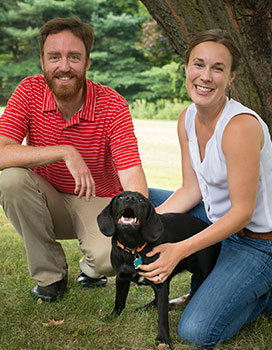Partnering against allergies
“The immune system is a doubled-edged sword,” says the Institute’s newest faculty member, Dr. Elia Tait Wojno, who studies immunity and immune disorders. When it’s working correctly, the immune system attacks invading bacteria, viruses, and fungi to protect an animal or person from infectious diseases. However, in the case of allergic diseases, the immune system mistakenly launches an attack against harmless substances, like pollen or certain foods, which actually hurts the body.
For more information:
Dr. Elia Tait Wojno's Profile Page
Dr. Charles Danko's Profile Page
For now, Danko and Tait Wojno are applying for joint grants to help carry the research to the next level. If you would like to help support this project or any of the other work at the Baker Institute with a donation, please contact our Development Assistant, Ms. Jackie Hinkle: 607.253.3093.

To help figure out why things go haywire, Tait Wojno has partnered with another Institute faculty member, Dr. Charles Danko, who is an expert in deciphering how cellular programs are written into the DNA sequences of species, and how these programs are affected by environmental factors like allergens. Danko has pioneered powerful new ways to tease apart complex cellular systems like the immune system. Using mice, Tait Wojno and her research team are comparing the immune response in animals that have allergic disease with the immune system of animals that do not have allergies. This comparison will allow them to see how the immune system changes during allergic disease, which could help to explain what goes wrong when the body launches an allergic response. In particular, Tait Wojno and her team are focusing on rare immune cells that contribute to allergic disease. Tait Wojno says that although they make up just a tiny part of the immune system, these cells are extremely important players in allergic diseases, so she’s isolating them and handing them over to Danko for further analysis.
For his part, Danko and his team will analyze individual cells, using bioinformatics techniques to identify which genes are turned on and off during the development of allergic disease. It’s an exciting new capability for immune research, says Danko, and the potential for new discoveries is great. “We’re going to survey all the genes currently in use by the cell,” says Danko. “Looking at the cellular system holistically will allow us to understand how the different genes work together during the process of allergic disease,” he says. Danko says they’re hoping to find inflammation pathways that no one had ever considered or known about before.
“This is an exciting opportunity to apply what I know to a problem and also apply new genetic approaches to learn unexpected things about the immune system,” says Tait Wojno.
Once the techniques are perfected in mice, Tait Wojno and Danko plan to study blood samples from dogs who visit the Cornell University Hospital for Animals for allergy treatment. Veterinarians near and far refer their patients to Cornell, including dogs suffering from allergies that haven’t responded to treatment. Ultimately, Tait Wojno and Danko hope to help dogs, cats, and humans that suffer from allergies by providing new information on how and why allergic disease occurs, which will help to inform the development of targeted new treatments.
This article originally appeared in our 2015 annual report.


